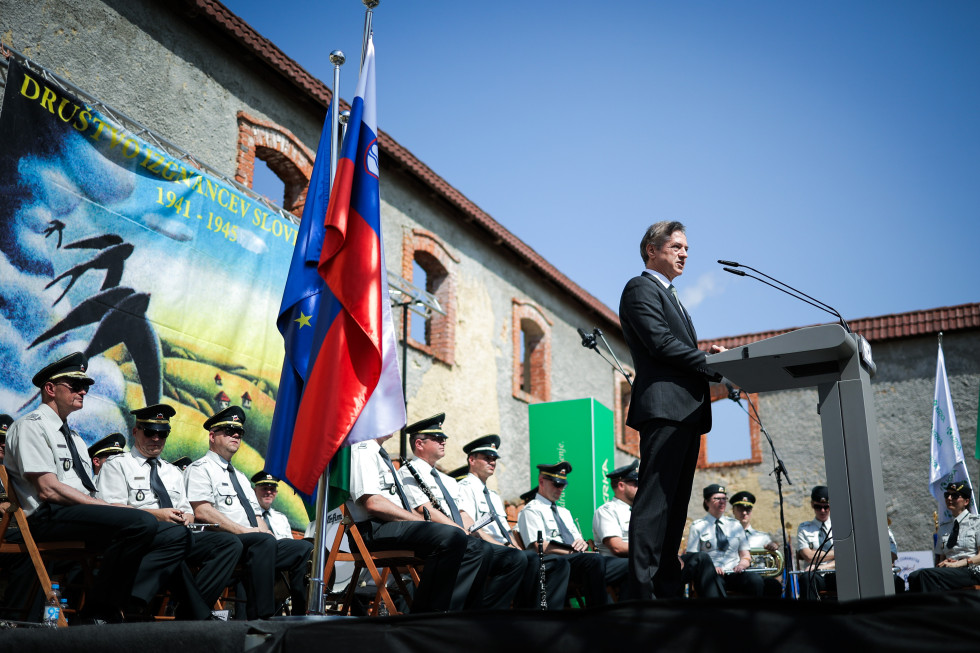Prime Minister Golob: "If anywhere, it is in this place that we can say that war is evil"

Prime Minister Robert Golob was the keynote speaker at today’s event at Brestanica | Author Daniel Novakovič, STA
The event was organised by the Slovenian Exiles Society in the courtyard of the castle stables, which was the site of the largest concentration camp for Slovenians scheduled to be exiled.
In his introduction, Prime Minister Robert Golob welcomed and paid tribute to the president of the Slovenian Exiles Society, Mrs Ivica Žnidaršič, who was unfortunately unable to attend today's event. "Without your persistent and decades-long reminders, memories, and hard work, we would not be here today. And most likely, this chapter in history would have ended without an epilogue. You are a great inspiration to us," said Prime Minister in the introduction of his address.
"It is with great pleasure that I am here today, on the Slovenian Exiles Day. "Not only because it is a day of remembrance, but because it is also a day of reminder and commitment for the future that we will create together," said the Prime Minister. "If anywhere, it is in this place that we can say that war is evil. Nazism and fascism were evil. And this memory must never be erased," said the Prime Minister, adding that such practices could continue if we remain silent when they could be prevented.
"Today there is no more time for silence, because the heirs of these same images are emerging all over Europe. It is our duty to prevent them from emerging in Slovenia as well. This is our shared commitment to future generations and to realising once and for all the well-known phrase: 'Never again, never again evil'," continued the Prime Minister. He stressed that, despite the fact that the war was over and the country was liberated, the exiles still had a long way ahead to reach freedom. They reached it in silence, but never subjected to oblivion, also thanks to the Slovenian Exiles Society.
"It took 80 years for the words about oblivion and injustice to be translated into action. Today is a day of action, when we will end this injustice once and for all, not just acknowledge it. The injustice you suffered was recognised thirty years ago, but has never been remedied," said the Prime Minister. He added that we, as a community, are strengthened by the awareness of injustice and that we must muster up the strength to not only acknowledge but also to amend injustices. "With this coalition and government, we are the first to have gathered this strength in the period of over thirty years of independence as a country."
The Prime Minister went on to say that in the Primorska region, from where he originates, people knew how to distinguish very clearly between good and evil. "Since we never tried to falsify history, it seemed self-evident that we had to redress the injustice suffered by the exiles just as we had to everyone else. In doing so, we are not guided by any ideological policy. By no desire to distort history, but a sincere desire to live better together," added Prime Minister Golob.
He concluded by saying that, when we gaze at the sun, it does not weaken us, but rather fills us with great positive energy. "May this energy remain with us today. Let us pass it on. Not in silence, but by acts of peace, by acts of positive energy and with the awareness that life can be better when we join our forces," concluded Prime Minister Golob.
According to the Slovenian Exiles Society, Robert Golob is the first Prime Minister of the Republic of Slovenia to hear the demands of exiles and refugees regarding war compensation. "Your commitment to eliminating injustices regarding material damage caused during World War II fills us with great hope that the relevant act will finally be adopted", it wrote.
On 25 April 2025, the coalition parties presented a bill to the Parliament, which is intended to facilitate payment of compensation to persons who suffered material damage during World War II. In this way, they want to provide the living victims of war violence – beneficiaries with recognised status of victims of war violence, which includes, among others, exiles, internees, concentration camp inmates and stolen children – with a symbolic compensation for the damage and the injustices they suffered.

